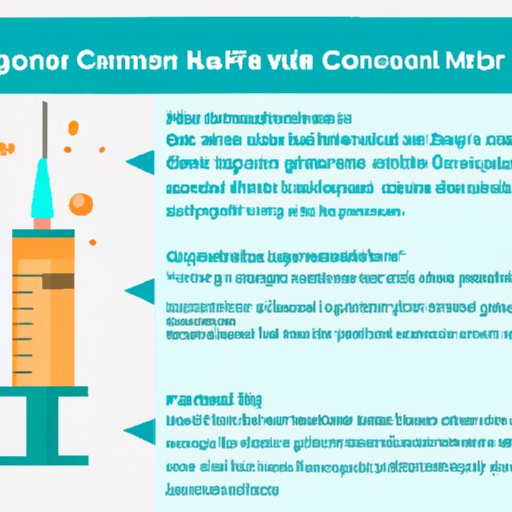Introduction
Cortisone injections, also known as corticosteroid injections, are a common medical treatment used to reduce inflammation. They can be used to treat a wide range of conditions, such as tendonitis, bursitis, gout, arthritis, and joint pain. Cortisone is a type of steroid hormone that is naturally produced by the body, which makes it an attractive option for medical treatments. However, like any medical procedure, there are both benefits and risks associated with cortisone shots.
Examining the Pros and Cons of Cortisone Injections
Before undergoing a cortisone injection, it’s important to understand the potential benefits and side effects. The most significant benefit of cortisone shots is that they can provide fast and effective relief from inflammation, swelling, and pain. According to a study published in the journal Pain Medicine, “In clinical practice, corticosteroid injections are often used to rapidly reduce inflammation and improve function in soft tissue and joint disorders.”
However, there are some potential side effects associated with cortisone injections. These can include skin discoloration at the injection site, temporary numbness or tingling, and increased blood sugar levels. Some people may also experience allergic reactions to the injected medication.

Investigating the Risk Factors Associated with Cortisone Injections
There are several factors that can increase the risk of side effects associated with cortisone injections. Age is one of the most important risk factors to consider. People over the age of 65 may be more likely to experience side effects from cortisone injections than younger individuals.
Health status is another important factor to consider when determining the safety of cortisone shots. People who have diabetes, high blood pressure, or weakened immune systems may be more likely to experience side effects. Additionally, the severity of the condition being treated and the frequency of injections can also affect the safety of cortisone shots.

Understanding the Benefits and Risks of Cortisone Injections
It’s important to understand both the short-term and long-term effects of cortisone shots. In the short term, cortisone injections can provide fast and effective relief from inflammation, swelling, and pain. However, the long-term effects of cortisone shots are less clear. There is some evidence that suggests that repeated cortisone injections may lead to joint degeneration, osteoporosis, and infection.
Analyzing the Long-Term Effects of Cortisone Shots
One of the potential long-term effects of cortisone shots is joint degeneration. A study published in the journal Arthritis Research & Therapy found that “long-term corticosteroid use may be associated with accelerated cartilage degradation and joint damage.”
Osteoporosis is another potential long-term effect of cortisone shots. A study published in the journal American Family Physician found that “chronic use of corticosteroids can cause osteoporosis and fractures.” Additionally, cortisone injections may increase the risk of infection. A study published in the journal Annals of Internal Medicine found that “patients receiving corticosteroids had an increased risk of infection.”

Assessing the Safety of Cortisone Shots in Different Medical Situations
The safety of cortisone shots varies depending on the medical situation. For chronic conditions, such as arthritis, cortisone shots may be a safe and effective treatment option. However, for acute conditions, such as sprains or strains, cortisone shots should be avoided due to the potential for increased risk of infection.
Cortisone shots are also not recommended for post-surgery recovery. A study published in the journal Anesthesia & Analgesia found that “corticosteroid injections should be avoided immediately after surgery due to the risk of wound healing complications.”
Conclusion
Cortisone shots can provide fast and effective relief from inflammation, swelling, and pain. However, there are some potential side effects and risks associated with cortisone injections. It’s important to understand the potential benefits and risks before undergoing a cortisone shot and to discuss the risks with a healthcare provider. Overall, cortisone shots can be a safe and effective treatment option for certain medical conditions, but it’s important to weigh the pros and cons before making a decision.
(Note: Is this article not meeting your expectations? Do you have knowledge or insights to share? Unlock new opportunities and expand your reach by joining our authors team. Click Registration to join us and share your expertise with our readers.)
